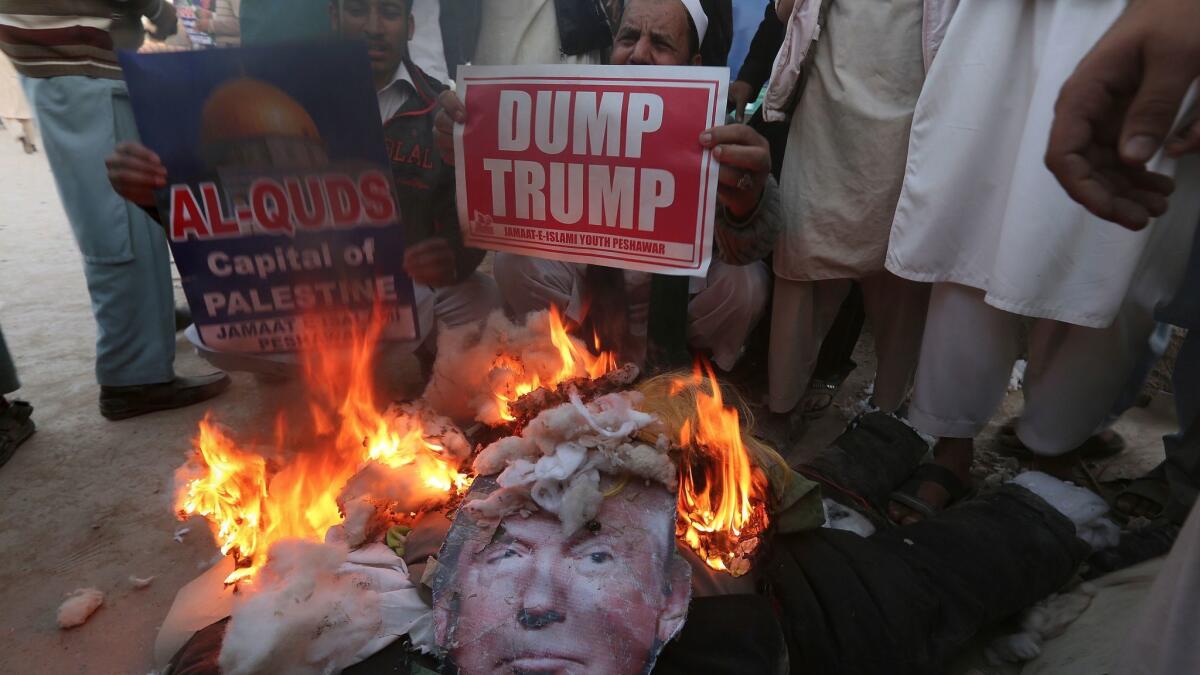Op-Ed: Trump is right about Jerusalem, but that’s not the help Israel needs

- Share via
Polite fictions are sometimes useful in international relations. For example, we pretend that Taiwan isn’t an independent country for fear of triggering a war with China, which claims Taiwan is no more than a breakaway province. But on the whole, it’s better to deal in fact rather than fantasy. And the fact is that Jerusalem has been the capital of Israel since 1949.
At first, the Jewish state only controlled West Jerusalem. But in the 1967 Six-Day War, it gained control of East Jerusalem, too. Initially the United States refused to recognize Jerusalem as the capital because it clung to the fiction that the holy city should be under international control, something that was never true on the ground. After 1967, the United States refused to recognize Jerusalem, because to do so would supposedly prejudice “final status” talks between Israelis and Palestinians, even though there is no scenario under which Israel would move its capital out of West Jerusalem. The only question is whether the Palestinians will be able to establish a state with a capital in East Jerusalem.
Israel is the only country in the world whose self-proclaimed capital — the place where its seat of government is located — is not widely recognized by the international community. Much as I oppose President Trump on many issues, he got this one right. My only complaint is that this move is more symbolic than substantive.
If Trump truly wants to help Israel, he will focus more on curbing the Iranian threat.
Contrary to fears that Trump’s decision would ignite a new conflict, it has sparked only sporadic protests, some of which featured more journalists than actual demonstrators. This is indicative of another new reality in the region: The Sunni Arab states are far more exercised about Iran than Israel these days, and they see Israel as a de facto ally to stop the spread of a new Persian Empire. Nor, as some critics feared, is Trump’s decision going to torpedo an Israeli-Palestinian “peace process” that was dead on arrival already.
The biggest blowback has come at the United Nations, where the General Assembly has now passed — by a vote of 128 to 9, with 35 abstentions and 21 absences — a resolution demanding that Trump rescind his declaration regarding Jerusalem. Trump and U.N. Ambassador Nikki Haley mishandled the vote by making clumsy threats to cut off funding to states that voted against the United States.
This is empty bluster. The United States won’t cut off aid to countries such as Egypt, Pakistan, Iraq and Afghanistan because it is not in our interest to do so. And because everyone knows the threats are empty, they backfired: Canada apparently decided to abstain rather than vote no because it didn’t want to be seen as an American puppet, while other countries cited the Trump threats as an extra incentive to vote yes.
But let’s get real: The United Nations has long had an anti-Israel bias. To take but one example, law professor E.V. Kontorovich notes: “Israel is referred to as the ‘Occupying Power’ 530 times in General Assembly resolutions. Yet in seven major instances of past or present prolonged military occupation — Indonesia in East Timor, Turkey in northern Cyprus, Russia in areas of Georgia, Morocco in Western Sahara, Vietnam in Cambodia, Armenia in areas of Azerbaijan, and Russia in Ukraine’s Crimea — the number is zero.”
The United States has often stood alone, or nearly alone, at the United Nations in supporting Israel. The outlier here is not Trump but President Obama, who last year abstained rather than veto a Security Council resolution condemning Israel’s West Bank settlements.
Trump’s declaration on Jerusalem is a welcome return to a more pro-Israel policy even if he isn’t actually moving the U.S. Embassy to Jerusalem anytime soon. The United States already has a large consulate building in Jerusalem; if Trump had so desired, Ambassador David Friedman could have relocated his office there already. But as he does so often, the president opted for symbolism over substance — proclaiming that he was going to move the embassy while signing a waiver from the law that obligates him to do so. He did something similar when he disavowed the Iran nuclear deal without actually scrapping it.
If Trump really wants to do something for Israel, he would do more to contest the Iranian consolidation of power in neighboring Syria, something that presents a far greater threat to Israel’s security than keeping the U.S. Embassy in Tel Aviv. There are credible reports that Iran is building a military base in Syria, where Iran is well on its way to becoming the dominant force. It is good to hear that, despite Islamic State’s defeat, the United States is not planning to pull its 2,000 or so troops out of Syria. But what is the U.S. plan to prevent Iranian domination of all of Syria? Those 2,000 troops will be inadequate to the task, and the Trump administration has cut off aid to the anti-Assad rebels, even while the president talks up cooperation with Iran’s ally, Russia.
Recognizing Jerusalem is the right thing to do. But if Trump truly wants to help Israel, he will focus more on curbing the Iranian threat — something that will be a lot harder to do, and carry greater risks, than simply issuing the kind of incendiary statements that he specializes in.
Max Boot is a senior fellow at the Council on Foreign Relations, a contributing writer to Opinion, and author of the forthcoming “The Road Not Taken: Edward Lansdale and the American Tragedy in Vietnam.”
Follow the Opinion section on Twitter @latimesopinionand Facebook.
More to Read
A cure for the common opinion
Get thought-provoking perspectives with our weekly newsletter.
You may occasionally receive promotional content from the Los Angeles Times.










